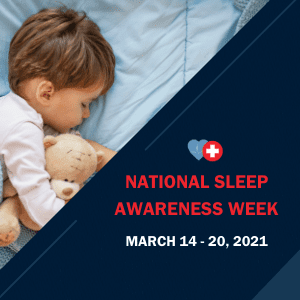National Sleep Awareness Week: March 14 – 20, 2021
 Daylight Saving Time is upon us, and while the extra hour of sunlight each day is nice, losing that hour of sleep can make you feel like you’re dragging. While this transition is temporary, if you’re one of the many in America who doesn’t get the recommended amount of sleep regularly, that feeling stays with you for the long term. During this time of catching up with the clock, we recognize National Sleep Awareness Week, educating one another on the importance of sleep and how to actually get a full night of rest.
Daylight Saving Time is upon us, and while the extra hour of sunlight each day is nice, losing that hour of sleep can make you feel like you’re dragging. While this transition is temporary, if you’re one of the many in America who doesn’t get the recommended amount of sleep regularly, that feeling stays with you for the long term. During this time of catching up with the clock, we recognize National Sleep Awareness Week, educating one another on the importance of sleep and how to actually get a full night of rest.
What is Sleep Awareness Week?
Launched in 1998 by the National Sleep Foundation (NSF), Sleep Awareness Week is a public health campaign aimed at celebrating sleep health and encouraging everyone to make sleep a priority in an effort to improve overall health and well-being. Throughout the week, the NSF shares valuable information about the benefits of sleep and its effects on health and safety to help remind and educate the American population. The organization also takes the opportunity to release their annual Sleep in America® poll results that shed light on the public’s current beliefs, attitudes, and behaviors about various sleep topics.
Why is Sleep Important?
On the surface, we know that sleep is important because of how a good night makes us feel in the morning. However, there are deeper reasons we should make it a priority to get the recommended amount of sleep. According to the Centers for Disease Control and Prevention (CDC), certain chronic diseases and conditions are linked to not getting enough sleep, like type 2 diabetes, heart disease, obesity, and depression. Sleep deprivation can also result in difficulty paying attention, a reduction in the ability to learn or understand, delayed reactions, or mood changes.
How Much Sleep Do I Need?
Everyone is different, so what is ideal for one person may not be what’s best for you. However, the CDC in conjunction with the National Sleep Foundation and American Academy of Sleep Medicine offers sleep recommendations based on specific age groups:
- Newborns (0-3 months): 14-17 hours
- Infants (4-12 months): 12-16 hours every 24 hours (includes naps)
- Toddlers (1-2 years): 11-14 hours every 24 hours (includes naps)
- Preschool (3-5 years): 10-13 hours every 24 hours (includes naps)
- School Age (6-12 years): 9-12 hours every 24 hours
- Teens (13-18 years): 8-10 hours every 24 hours
- Adults:
- 18-60 years: 7 or more hours each night
- 61-64 years: 7-9 hours
- 65 years and up: 7-8 hours
How to Get a Better Night’s Sleep
So, you know how much sleep you should be getting, but how can you actually make it happen? It’s possible certain seemingly-harmless habits could be disrupting your sleep each night, so by making small changes to your behaviors, you could help improve your sleep.
- Keep a consistent routine surrounding when you go to bed and when you wake up in the morning, even on the weekends.
- Ensure your bedroom is quiet, dark, relaxing, and set at a comfortable temperature.
- Remove all electronic devices from your bedroom, such as TVs, computers, and smart phones.
- Avoid eating large meals or drinking beverages with caffeine or alcohol in the hours leading up to bedtime.
- Be physically active during the day as it can help you fall asleep faster at night.
If you try changing your usual habits and are still experiencing trouble sleeping, there could be a different underlying cause. Try keeping a sleep diary for at least ten days before an appointment with your doctor that will help them key in to any potential issues with your routine or health. It is possible you could have a specific sleep disorder that may require medical attention to help remedy.
This Sleep Awareness Week, may rest a priority by trying to improve your habits and encourage those around you to do the same. For more information or if you have concerns about your own sleep health, visit us at Midwest Express Clinic today.




